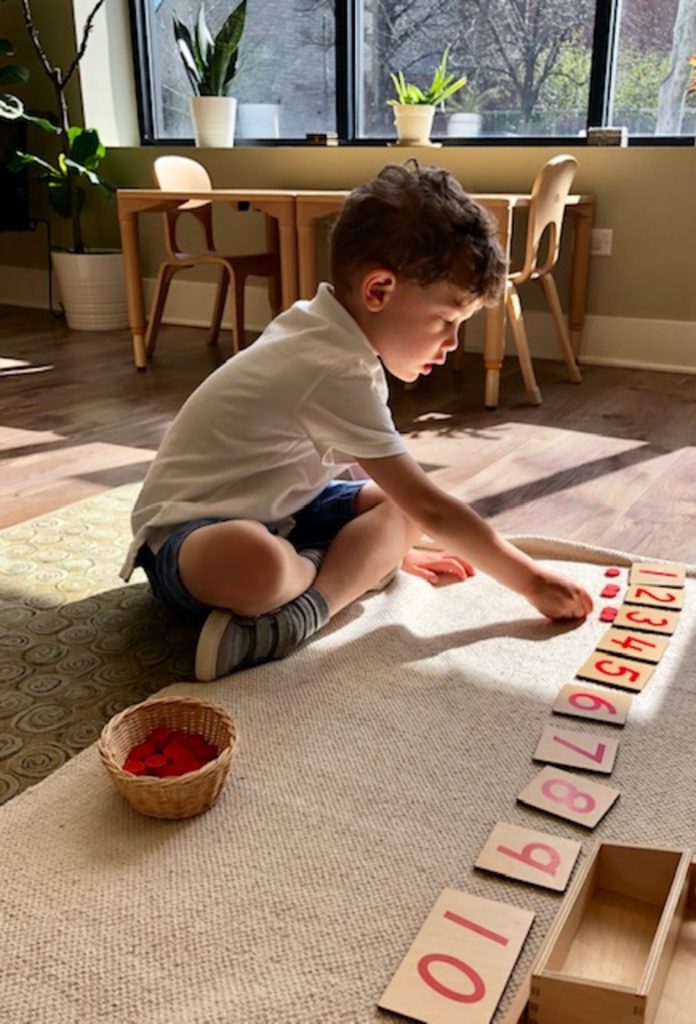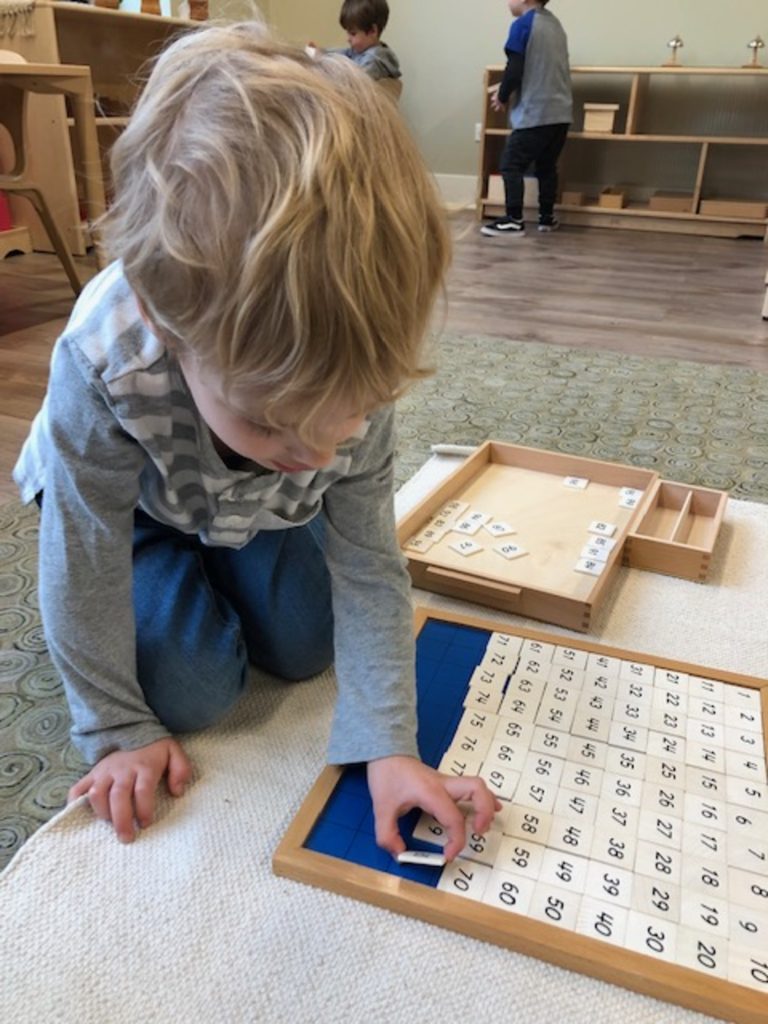By: Margaret Combs, Spark Montessori’s Director of Education
How is it that all humans are born with a Mathematical Mind and yet so many children and even adults grow up believing math isn’t for them?
The answer partly lies in how mathematical concepts are taught from an early age. The most common problem is that mathematical concepts are taught in an abstract way much too quickly. Children learn through their hands and need concrete manipulatives to help them understand the world around them. This is what Montessori Math does at its most basic level but there is so much more.
‘Children display a universal love of mathematics,
which is par excellence the science of precision, order, and intelligence.’
-Maria Montessori Her Life and Work
Maria Montessori approached math education in a revolutionary manner that has proven just as effective today as it was over 100 years ago. She asserted that all humans are born with what she called a “Mathematical Mind,” which is a mind that has a propensity to learn new things in an exact and orderly manner.
Maria Montessori approached math education in a revolutionary manner that has proven just as effective today as it was over 100 years ago. She asserted that all humans are born with what she called a “Mathematical Mind,” which is a mind that has a propensity to learn new things in an exact and orderly manner.
Repetition and Sequence Lay the Foundation

In the Montessori classroom, all preparation for future learning is done through work with Practical Life and Sensorial materials. Practical Life work allows a child to learn how to care for themselves as well as their environment. Each activity is presented in an ordered sequence which the child can repeat and perfect while building a strong sense of order, coordination, and motor skills. Sensorial materials aid in the development of the senses which is foundational to a young child’s learning.
These early works lay the framework for the development of necessary skills in general and in direct correlation to mathematical thinking. Because young children have a sensitivity to order, early materials are designed to support this development and are presented in an exact and precise manner. This exposure to order and sequence is absorbed by the child and forms the foundation of the child’s mathematical mind while giving him/her the opportunity to coordinate fine and gross motor ability, build concentration, and a sense of independence. As a child builds self-confidence around key mathematical concepts, their excitement towards the learning of math is awakened.
Logical Thinking Is Stimulated by Montessori Materials
Montessori believed that the mathematical mind was one that had the ability to see and identify similarities, differences, and patterns as well as to estimate and sequence. This overriding goal of logical thinking is woven through many of the materials in the classroom which are designed with great aesthetic beauty and mathematical precision.
The Sensorial curriculum uses physical objects to build the mathematical ability for the child to classify, compare, reason, generalize, and differentiate while allowing the child to engage and refine their senses which is a young child’s primary means of experiencing the world around them. For example, by exposing children to differing 3-dimensional geometric shapes, a child can see and feel the specific properties that make each shape what it is and how it compares and contrasts to others like it. This sensory process makes geometry something real and tangible to the young child.
Concrete Learning vs. Rote Memorization

Another striking aspect of the Montessori math curriculum is that is relies heavily on concrete experiences instead of rote memorization. The specific sequence to the presentation of materials builds upon previous knowledge gained through the child’s interaction with earlier materials so that knowledge is built on a firm base of understanding. Through concrete and tangible experiences presented in a logical sequence, a child is able to fully internalize very abstract concepts. Montessori named this concept “materialized abstractions.” For example, the concept of numbers themselves is very abstract and can be challenging for a child to fully grasp.
Therefore, when working with the math materials, the concepts of quantity, number symbol, and the association of the two are taught separately so each can be understood fully. The quantity is always given to the child first with physical objects that allow him to interact with a concrete manifestation of a specific quantity. They are then presented with the symbol or number that is associated with the quantity. Through this interactive approach, the child is much more likely to internalize the abstract concept of math instead of simply memorizing the sequence of numbers without a greater understanding of them.
This method prevents frustration in the future when the child is exposed to more complex mathematical work that requires the use of these basic mathematical skills.
The Building Blocks of Math Begin Earlier Than You Think
A child who starts in the toddler program will develop many necessary prerequisite skills for the development of math skills. Activities that promote the development of the senses and refine a child’s natural sense of order begins the journey into mathematical understanding. In tandem with these direct skills, developing a sense of competency as well as the ability to concentrate and problem solve allows a toddler to tackle the more complex work that they will encounter in the Primary and Elementary classrooms.

Once the child enters into the Primary program, the child will come in contact with many mathematical concepts starting with basic numeration from 1-10. As curriculum areas are mastered, the child moves into more complex concepts. Other areas a child will encounter are the decimal system, linear counting through the thousands, operations, fractions, and other abstract concepts. Even Algebraic concepts like equations are introduced implicitly at the Primary level through materials that act as concrete manifestations of these abstract concepts.
A Love of Math Is Formed
In Montessori classrooms, children adore working with ‘big numbers’ and are quite capable when given the proper apparatus to utilize. When the child is allowed the time to explore and move through the curriculum naturally, their mathematical mind comes alive. They develop a deep understanding of mathematical concepts and a love of math that can last a lifetime.
